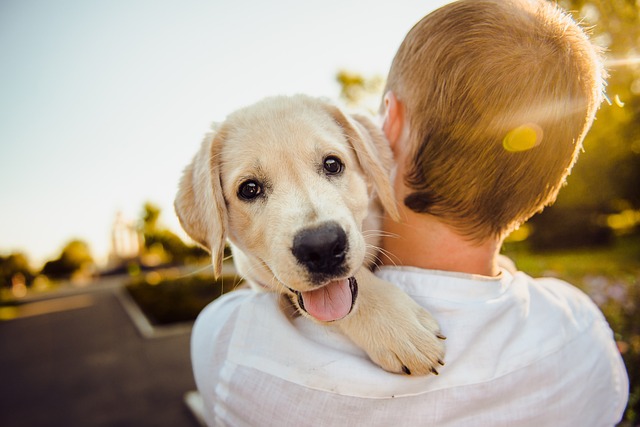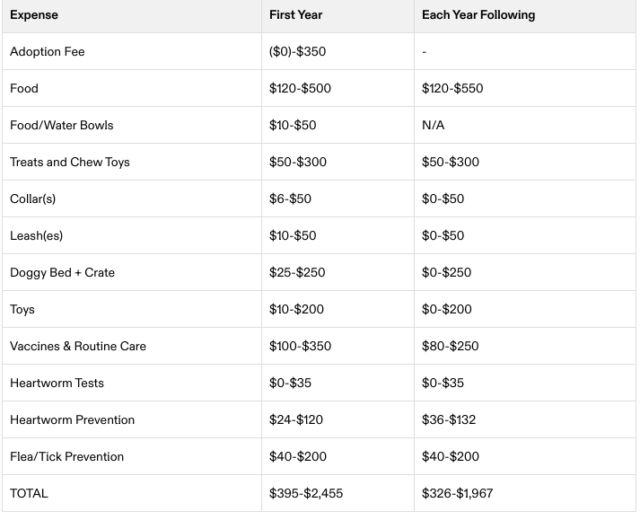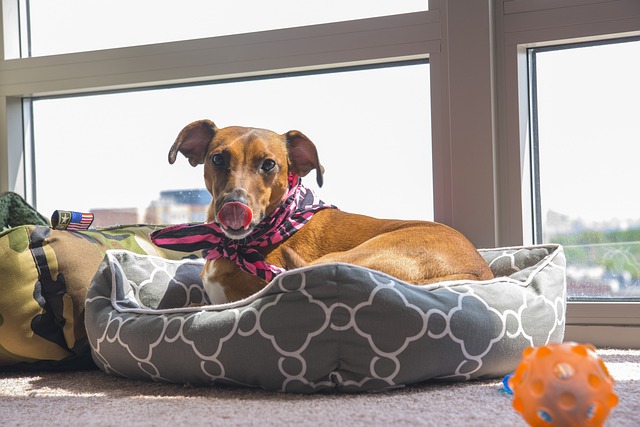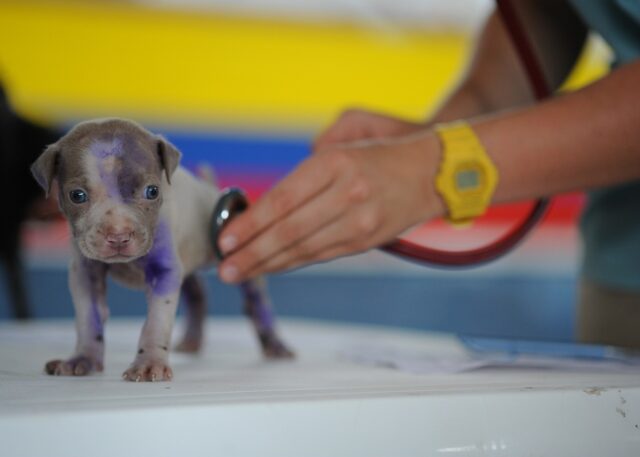Are you wondering how much it will cost to be a puppy parent and if pet costs are affordable? The good news is, yes, it’s affordable, but you need to plan because caring for a dog is a lifetime expense and a significant investment when done correctly.
Dog vaccinations can set you back hundreds of dollars each year, with puppies needing a series of vaccinations due to their immature immune systems. While the vaccine schedule for puppies is usually between three to four weeks apart, and the final vaccines are administered around four months of age, many other puppy costs must be considered.
According to USA Today, the average annual cost of owning a dog is $376 a month or $4,512 a year. This includes adoption or purchase fees and yearly expenses like vet care and pet supplies. Puppy vaccines and spaying and neutering can cost from $50 to $500, depending on where you live and the veterinary clinic you use.
In this blog, we’ll look at all the puppy care costs, including things like doggie daycare or a dog walker if you work and pet health insurance. So, how much does it cost to own a puppy?
“Consider all dog costs, including food, shelter, medical care, grooming, environmental enrichment, and training, to make sure you can afford the annual cost of a dog,” explains USA Today. Here’s the takeaway:
The Average Cost of Owning a Puppy From Petfinder
Petfinder says that you can expect the average cost of a puppy or adult dog to be $395 in the first year and $326 each year after that. Petfinder adds that it all depends on where you live, the kind of toys you decide to buy, and where you shop.
“Keep in mind that the cost of a puppy could be higher than that of an adult dog, and those numbers don’t include unknowns like emergency veterinary care or variable costs like boarding, professional grooming or training,” says Petfinder.
How Much Does a Puppy or Dog Cost?
Basic costs include just that—basic costs! We used Petfinder’s estimates but found that their estimated yearly food costs and some of their other forecasts needed to be higher.
Here’s a breakdown of the estimated expenses associated with owning a dog, taking into account both the initial year and subsequent years:
Here are the estimated costs related to dog ownership:
Adoption fees typically cover a range of additional costs, like spaying/neutering and various veterinary tests.The total costs for the first year can range from $395 to $2,455. For each following year, the estimated cost is between $326 and $1,967. These costs are estimates and actual costs may vary depending on various factors such as the size and breed of the dog, location, and personal preferences.
Beyond the basic expenses of owning a puppy, additional costs should be considered, like emergency veterinary care, professional grooming, training, toys, treats, collars, harnesses, and dog beds. A new puppy will need a lightweight puppy collar and harness, a puppy dog bed, a leash, puppy food, training classes, and puppy vaccinations.
Additional costs include:
- Emergency Vet Care: This expense is an important consideration and can vary widely based on the nature of the emergency and the treatment required. Pet owners should set aside funds for unexpected medical expenses.
- Professional Grooming: Depending on the breed and coat type, professional grooming services may incur an average annual cost ranging from $300 to $600 or more, as reported by the American Kennel Club (AKC).
- Training: Puppy training classes or private sessions run at $200 as an initial one-time cost with a professional trainer, according to The American Society for the Prevention of Cruelty to Animals (ASPCA).
- Toys, Treats, Collars, Harnesses, and Dog Beds: The cost of these items can vary widely based on brand, quality, and the puppy’s specific needs, adding to the overall expenses of puppy parenting.
How to Reduce Puppy Care Costs
Owning a dog can be expensive, and you should avoid making impulsive decisions when purchasing a puppy. ” Selecting a pet that is suited to your home and lifestyle and avoiding impulsive decisions” is a responsibility, says the AVMA. ” Recognizing that owning a pet(s) requires an investment of time and money.Keeping only the type and number of pets for which you can provide an appropriate and safe environment. This includes appropriate food, water, shelter, health care, and companionship.”
The ASPCA says that you can reduce puppy care costs by doing the following:
- Schedule Regular Check-Ups: Don’t overlook your dog’s annual examination. Preventing illnesses is more cost-effective and less risky than treating them. Research different veterinary practices to compare fees for preventive care.
- Personalize Your Pet’s Vaccines: Some vaccines are optional, while others are crucial for preventing serious diseases. Discuss personalizing your puppy’s vaccine protocol with your veterinarian to ensure they receive necessary protection while avoiding unnecessary costs.
- Spay or Neuter Your Pet: Prevent serious health issues, including cancers, by spaying or neutering your pet. Many local shelters offer low- or no-cost spay/neuter surgeries. Find a program in your area through our online database.
- Brush Your Puppy’s Teeth: Establish a dental routine to maintain your pet’s oral health and prevent expensive dental procedures.
- Protect Your Puppy from Parasites: Flea and tick infestations can lead to costly medical problems. Use a topical flea and tick solution to keep these pests at bay.
- Quit Smoking: Secondhand smoke can harm pets, causing various health issues. Quitting smoking benefits your dog’s health and helps you save on potential vet bills.
- Consider Pet Health Insurance: If emergency vet visits or serious illnesses are financially straining, consider pet health insurance for your puppy.
- Buy High-Quality Pet Food: Feed your puppy a high-quality puppy food formula and avoid overfeeding to prevent obesity and related health problems.
- Groom Your Pets at Home: Brush your puppy regularly to avoid mats and tangles. If you need to learn how to clip, do so because it will help save a ton of money at the groomer.
How Much is a Puppy’s First Vet Visit With Puppy Vaccinations?
The cost of a puppy’s first vet visit with vaccines can vary based on several factors, including the location, the specific services provided, and the veterinarian’s pricing.
For example, according to Forbes Advisor, if your puppy gets three core vaccines, like rabies, distemper, and Bordetella, these would cost around $92.
Getting a health insurance policy for your puppy right after this first exam is a good idea. It could save a life in an emergency,” says the American Kennel Club. You can also look for low-cost vaccination clinics near you to save money.
Puppy Enrichment: Boarding, Doggie Daycare & Dog Sports
If you’re like us, we’re all for puppy enrichment and doggie daycares instead of leaving your puppy home while you go to work.
Rover says that dog boarding prices range from $45 a night and dog walking at $20 per walk. But this also varies based on where you live and your chosen dates.
Puppy Training Cost
Regarding puppy training, the costs can vary based on various factors, including the type of training, the location, and the trainer’s experience level. Here’s an overview of the estimated costs based on the information gathered from various sources:
- Group Training Classes: An introductory 6-week training class can range from $149 at PetSmart for group training classes for pups ten weeks to 5 months old, where both owners and dogs learn alongside others. Petco offers a six-week program for around $109, with occasional specials for as low as $80. Petco has puppy group training classes for pups 8 to 16 weeks, which also helps with potty training.
- Private Dog Training: Private in-home dog training can range from $100 to $250 per hour, depending on the complexity of the issues being addressed and the trainer’s experience.
- Dog Obedience Training: On average, dog obedience training costs $30 to $50 per class. Basic obedience classes can range from $50 to $125 for a 4 to 8-week puppy training course.
Cost of a Puppy
When considering the cost of a puppy, it’s essential to consider many factors, including initial expenses and ongoing care. The overall cost can vary significantly based on breed, size, and specific needs. The initial purchase price of a purebred puppy from an ethical and reputable breeder or pet counselor in the US typically ranges from $1,800 to $3,000 or more. Pet counselors and reputable dog breeders like Pettito Dallas that match up puppies with potential new owners allow for limitless interaction and playtime between puppies of your choice.
Final Thoughts
Puppies bring an abundance of joy, love, and laughter into our lives. Their playful antics and unwavering loyalty make them our best friends. However, it’s essential to recognize that welcoming a puppy entails long-term commitments and financial responsibilities.
Before getting a puppy, you should always consider future financial implications and decide whether your budget can handle the additional monthly costs.
Most importantly, you should also consider which expenses will be recurring and which will be a one-time thing. Dog food, pet meds, supplements, routine veterinary costs, and pet insurance costs are recurring expenses that must be considered.The AVMA also adds that recognizing declines in your pet’s quality of life and making decisions in consultation with your veterinarian regarding appropriate end-of-life care (e.g., palliative care, hospice, euthanasia) is part of responsible pet ownership.
FAQ: How Much Does a Puppy Cost?
Q: Can I afford a puppy?
A: We looked at what Redditors had to say, who all seemed to agree that you must have a financial plan and enough time to train and exercise your puppy. Remember that you’ll need to pay a pet deposit if you rent and have enough money for doggie daycare if you work all day.
Q: How much money do I need to have a puppy?
A: “I’d suggest waiting and seeing how the budget pans out in real life. The day-to-day expenses of a dog are probably within your budget, but it’s the extras and the lifestyle changes that I’m not sure you are factoring in. Vet bills can rack up quick for even a minor problem,” says one Redditor. Getting pet insurance helps with veterinary emergency bills.
Q: What is the yearly average cost of owning a dog?
A: The yearly average of owning a dog, according to Petfinder, can range from $395 to $2,455. You’ll need to look at potential professional grooming costs, veterinary costs for vaccines, puppy training classes, and board and travel fees if you go out of town or take your puppy with you on pet vacays.
Toys, treats, collars, leashes, dog beds, blankets, puppy food, dog shampoo, and supplements also come into play. Getting a puppy is affordable, but you must look at pet care costs before going out and purchasing a puppy. Owning a puppy is a privilege and a huge responsibility that needs to be taken seriously for your dog’s entire life. ( 12-15 years)
Q: Is $2000 too much for a puppy?
A: Getting a well-bred from a reputable breeder can generally run from $1600 to a few thousand dollars. Getting a new furbaby does not have to break your budget!
“If you decide to purchase a purebred dog from a breeder, you can expect to spend $500 to $2000,” says Brandi Hunter at AKC via CNBC.
You can work with reputable pet experts and counselors like Pettito Dallas and purchase a puppy via a monthly payment plan. Every puppy is backed by a health guarantee, which includes one year against congenital-hereditary diseases.
You also get 30-day health insurance with Metlife included so that you can have peace of mind, along with other benefits like free vaccines, free health exams with a licensed veterinarian, free nail trimming, and limitless puppy interaction.
How much does it cost to own a dog?
https://www.youtube.com/watch?v=wWQar4MsJDg
Video credit: N26








